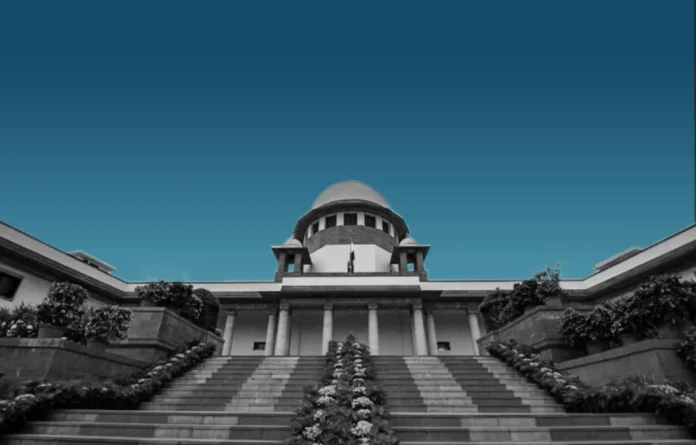The Supreme Court on Tuesday refused to grant bail to former Indian Police Service (IPS) officer Sanjiv Bhatt in a 1990 custodial death case.
The Bench of Justice Vikram Nath and Justice Sandeep Mehta dismissed the petition filed by the expelled Gujarat IPS officer on the grounds that it was not inclined to suspend the sentence and release Bhatt on bail.
The top court of the country, however, said that the appeal filed by Bhatt would be heard on a priority basis.
Earlier on February 28, the Apex Court had reserved its verdict on the Special Leave Petition filed by Bhatt seeking suspension of sentence awarded to him by the Gujarat High Court in the 1990 case.
Appearing for the former IPS officer, Senior Advocate Kapil Sibal had contended that there was no evidence to convict Bhatt, who has remained in custody for more than five years.
As per Sibal, medical evidence suggested that the victim, Prabhudas Madhavji Vaishnani, died due to pre-existing medical conditions. There was no medical evidence of any physical torture.
The death happened about 20 days after the release of the victim from custody. Although the victim had immediately met the family doctor after release, he did not make any complaint of police torture, added the Senior Counsel.
He remarked that if these kinds of trials started taking place, where would the country go?
Representing the State of Gujarat, Senior Advocate Maninder Singh refuted the petitioner’s arguments. He said the medical evidence showed that the victim died due to renal failure, caused by the forceful sit-ups and crawling, which he was made to do by the police throughout the night. There was clear evidence that torture led to kidney problems.
Singh pointed out that Bhatt was serving a 20-year sentence in another case, relating to planting of drugs to implicate a person. There were no justifiable circumstances to suspend the sentence, considering the evidence on record and also other criminal antecedents of the convict, he added.
He further said that the Supreme Court had earlier dismissed Bhatt’s petitions to suspend the sentence while his appeal was pending in the Gujarat High Court.
Appearing for the informant (brother of the deceased), Advocate Vanshaja Shukla highlighted that it was a case where justice was delivered nearly 30 years after the incident and that the Courts must be mindful of the rights of the victims.
The matter pertained to the death of one Prabhudas Madhavji Vaishnani in November 1990, which was allegedly due to custodial torture. At the time, Bhatt was the Assistant Superintendent of Police Jamnagar, who, along with other officers, took into custody about 133 persons, including Vaishnani, for rioting during a Bharat Bandh.
Vaishnani was kept in custody for nine days. He died 10 days after release on bail. As per medical records, the cause of death was renal failure.
Following his death, an FIR was registered against Bhatt and a few other officers over the allegations of custodial torture. A Magistrate court took cognisance of the case in 1995. The trial, however, remained stayed till 2011 due to a stay by the Gujarat High Court. The stay was later vacated and the trial commenced.
In June 2019, a Sessions Court in Jamnagar district of Gujarat sentenced Bhatt and police constable (Pravinsinh Zala) to life imprisonment in the case after convicting them under Sections 302 (murder), 323 (punishment for voluntarily causing hurt) and 506 (1) (punishment for offence of criminal intimidation) of IPC.
The court also found police constables Pravinsinh Jadeja, Anopsinh Jethva and Kesubha Dolubha Jadeja, along with police sub-inspectors Shailesh Pandya and Dipakkumar Bhagwandas Shah guilty of custodial torture, and convicted them under Sections 323 and 506 (1) of IPC.
Zala, Bhatt, Shah and Pandya filed a criminal appeal in the High Court in 2019.
The Bench of Justice Ashutosh Shastri and Justice Sandeep N Bhatt refused to interfere with the trial court order on the grounds that the reasoning given by the Jamnagar Court was correct.
The case pertains to an incident which took place in 1990 when Bhatt was an additional superintendent of police at Jamnagar district.
He had detained nearly 133 persons under the Terrorist and Disruptive Activites (Prevention) Act (TADA) after a communal riot broke out there.
The riots took place after the Bharatiya Janata Party (BJP) and the Vishwa Hindu Parishad (VHP) had called for a Bharat Bandh on October 30 that year, to protest the arrest of Lal Krishna Advani, the then BJP chief, who had started a Rath Yatra procession to Ayodhya for the Ram Mandir issue.
Among the detained persons, one Prabhudas Vaishnani died after being released from custody.
His family alleged that he was subjected to custodial torture by Bhatt and his colleagues.
Vaishnani was in police custody for nine days but after being released on bail, he had died of renal failure.
Subsequently, an FIR was registered against Bhatt and other officers for custodial death and cognisance was taken by a Magistrate in 1995.
A total of seven police officers were accused in the case including two sub-inspectors and three police constables.
A Sessions Court in Gujarat’s Jamnagar convicted Bhatt and another policeman and sentenced them to life imprisonment.
The Gujarat High Court in January 2024 dismissed Bhatt’s appeal against the conviction and sentence.
He then approached the Supreme Court which issued notice to the Gujarat government in the matter in August 2024.
The Court then heard the aspect of suspension of sentence before reserving its verdict on the same.
Bhatt is an accused in two other cases as well – a 1996 drug planting case and a 1997 custodial torture case.
He was convicted by a sessions court in the 1996 case and sentenced to 20 years in prison for the same. His appeal against the same is pending before the Gujarat High Court.
He was acquitted in the latter case in December 2024 by a Magistrate court.


